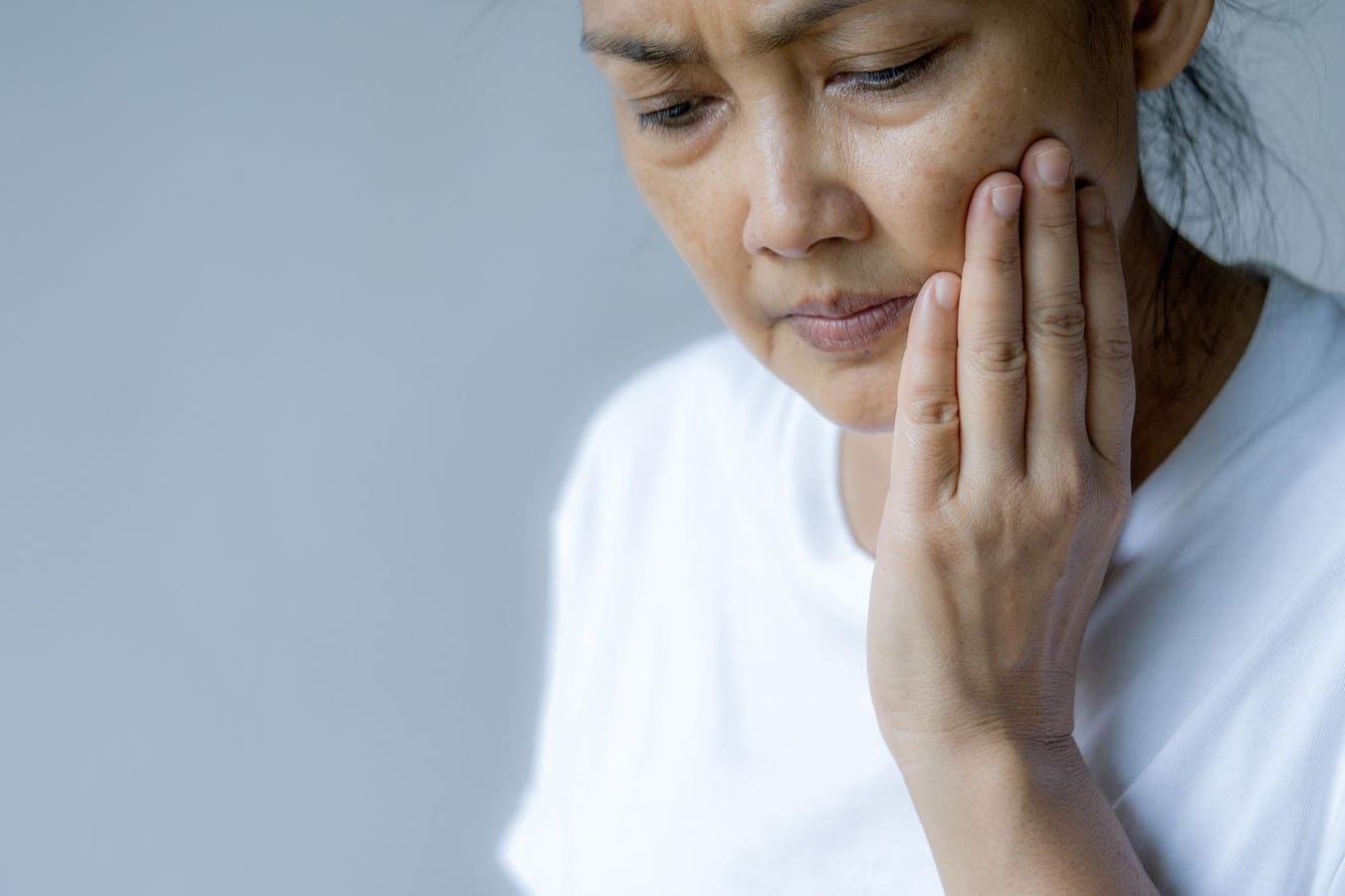A woman feeling pain, holding her cheek with hand and suffering from toothache.
Menopause affects women’s bodies in many ways, and there is a growing awareness that it is more than hot flashes and night sweats.
But many of us still don’t realize how far-reaching the consequences of life change can be, reinforcing negative stereotypes and leaving women unprepared.
Around 90% of Britons are unaware that there is a link between menopause and oral health, according to the results of a survey commissioned by independent British healthcare provider Bupa.
Of the 2,001 people surveyed for the study, 86% of women and 94% of men did not know that changes to their teeth, tongue or gums could be linked to menopause.
In reality, it can lead to gum disease, toothache and even tooth loss. But with proper care and treatment, many oral health problems can be resolved.
Why does menopause affect oral health?
Hormone levels fluctuate as a woman approaches menopause. Estrogen drops and eventually a woman’s periods will stop altogether.
We may think of estrogen as a sex hormone, but it actually plays a key role in a variety of physiological processes.
“We need estrogen for virtually every bodily function a woman has,” Dr Sam Wild, GP and clinical lead for women’s health at Bupa, told me. “We need it for our healthy teeth, for our bones, for our ligaments and also for the membranes in our mouth. So as levels drop, women become more susceptible to oral health problems.”
It can also change the appearance of the mouth, according to dentist Jason B Cellars, who runs Seacliff Dental in California. He told me that reduced blood flow to the gums increases the risk of recession, which can make teeth appear longer and darker.
“The other concern is bone loss due to periodontal disease,” he added. “With less protection against infection and disease, bone loss around the teeth can lead to cavities.”
Dry mouth
Dry mouth is one of the most common oral health problems women face during menopause.
Menopause is associated with both a decrease in saliva production and a change in its composition, said Caitlin Miller, hygienist and head of hygiene and therapy at Bupa Dental Care.
“Saliva can become quite sticky and thick,” she said. “That causes problems with speaking and swallowing, and it can lead to bad breath.”
That’s because having a drier mouth makes it easier for bacteria to grow. This can lead to tooth decay, gum disease, toothache, sensitivity and ultimately tooth loss.
“Our saliva neutralizes our mouth when we eat and it plays a big role in preventing cavities,” said Dr. Cellars. When saliva flow decreases, the chance of developing cavities “increases dramatically,” he added.
Burning mouth
Another common problem associated with menopause is known as ‘burning mouth’.
“This is just a constant pain that can be felt anywhere in the mouth and throat,” says Dr. Wild. “It can be very debilitating and it can also change people’s tastes, especially when it comes to salty foods and acidic foods.”
A woman attends a dentist appointment. Regular dental checkups are more important than ever during … [+]
Mental health
Many women suffer from mental health problems during menopause and perimenopause, and oral health problems can make this worse.
Women can “lose their self-confidence and self-esteem because of all these changes that are happening physically and mentally,” said Dr. Wild. “Feeling like you also have bad breath is really not good.”
Mental health is related to oral health, apart from its influence on self-esteem.
Researchers are studying how bacteria in the mouth can affect other parts of the body.
Improving your oral health, Miller said, can change the composition of bacteria in other parts of your body.
“When we clear out bacteria in the mouth, which is the gateway to the rest of the body, we help gut health,” she said. And as a growing number of studies suggeststhe bacteria in your gut can affect your brain health and your mental well-being.
Maintaining oral health during menopause
Many women are unaware of the impact of menopause on their oral health. They may not realize that they can get help from their dentist or dental hygienist, or that they may need to take more care of their teeth than before.
Many oral health problems can be improved and even resolved with good oral hygiene. This means that you brush your teeth twice a day with fluoride toothpaste and regularly clean between your teeth with interdental brushes or dental floss.
If you visit a dentist or dental hygienist regularly, you can spot new problems as quickly as possible. They may recommend products such as sprays to soothe dry mouth.
They can also show you how to properly brush and floss your teeth – something that is often learned in childhood and never revisited.
“I recently gave a talk to an audience of 80-year-olds,” Miller said. “I had a woman come up to me and say, ‘I never knew I should have done it this way.’”
Lifestyle changes, such as drinking less alcohol, quitting smoking, eating healthy and getting enough sleep, can also help improve oral health.
Many women going through menopause drink more alcohol to help manage symptoms. But in reality, this can make menopausal symptoms – including oral health problems – worse.
“It’s actually the advice we would give to everyone to some extent,” Dr Wild said. “All this normal advice becomes even more important during menopause.”
Medical treatment
Lifestyle, she added, “is absolutely necessary.” But it is not always enough to control symptoms.
Doctors may eventually prescribe hormone replacement therapy to ease the symptoms of menopause and perimenopause—and women may become eligible before they know it.
“I think many women feel like they can’t get HRT until their periods have stopped, and that’s not true,” said Dr. Wild.
Talk to your doctor for more information about HRT, she added. “Make informed decisions about whether treatment is right for you.”





















